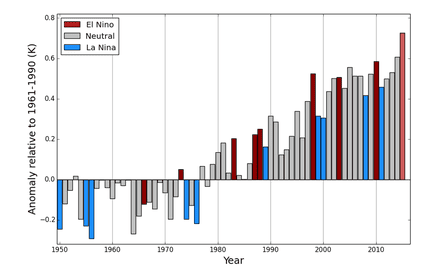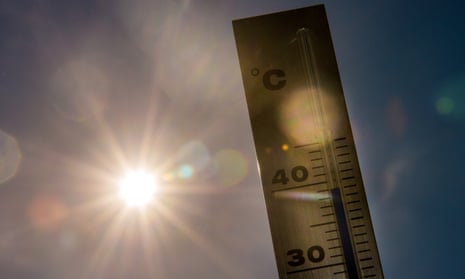Climate change made 2011-2015 the warmest five-year period on record, according to the World Meteorological Organisation’s (WMO) state of the global climate report.
This year is set to be the single hottest ever registered, with planetary temperatures passing the symbolic milestone of 1C above pre-industrial levels.
The WMO’s stock-take attributes the sweltering conditions to a cocktail of man-made global warming and the effects of the El Niño oceanic phenomenon.
“The state of the global climate in 2015 will make history as for a number of reasons,” the WMO’s secretary-general, Michel Jarraud, told a press conference in Geneva. “2015 is likely to be the hottest year on record, with ocean surface temperatures at the highest level since measurements began. It is probable that the 1C Celsius threshold will be crossed. This is all bad news for the planet.”

Extreme weather events such as heatwaves can now be attributed to anthropogenic climate change with greater confidence, Jarraud said. Last summer, 2,500 people died in India during a heatwave blamed on climate change, while Pakistan recorded another 2,000 fatalities as temperatures soared as high as 49C. “There were significant, record heatwaves in many parts of the world [in 2015],” Jarraud said. “Can we attribute these extreme weather events to climate change? When it comes to temperature, the answer is increasingly yes for some of the big ones.” Research indicated that the probability of such sweltering conditions had risen by a factor of up to 10 because of climate change, he added. China experienced its warmest ever year on record in 2015 in the period to October, while the continent of Africa is currently undergoing its second warmest. Other increasingly severe weather events such as floods, droughts and tropical storms were developing in line with the WMO’s expectations, based on climate models.
The WMO report comes less than a week before more than 130 world leaders are due to meet in Paris for a landmark climate change summit on emissions cuts beyond 2020.
Prof Sir Brian Hoskins, chair of the Grantham Institute at Imperial College London, said: “Carbon dioxide in the atmosphere is at record levels and so are global temperatures. These are indicators of the big climate problem we are creating for ourselves, and set the tone of great urgency for the negotiators in Paris to make a meaningful agreement that will put us on the road of greenhouse gas emission reductions and elimination that will limit climate change to an amount that we can probably cope with.”

Comments (…)
Sign in or create your Guardian account to join the discussion